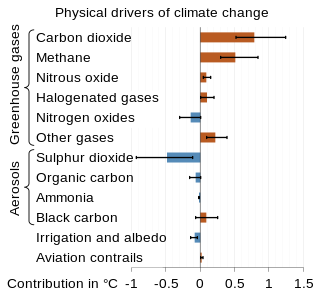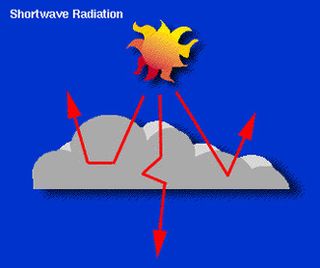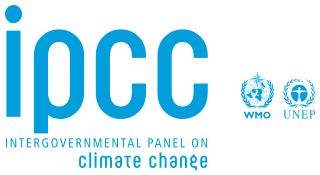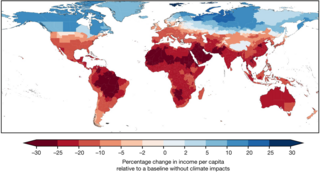
The scientific community has been investigating the causes of climate change for decades. After thousands of studies, it came to a consensus, where it is "unequivocal that human influence has warmed the atmosphere, ocean and land since pre-industrial times." This consensus is supported by around 200 scientific organizations worldwide, The dominant role in this climate change has been played by the direct emissions of carbon dioxide from the burning of fossil fuels. Indirect CO2 emissions from land use change, and the emissions of methane, nitrous oxide and other greenhouse gases play major supporting roles.

Cloud feedback is a type of climate change feedback, where the overall cloud frequency, height, and the relative fraction of the different types of clouds are altered due to climate change, and these changes then affect the Earth's energy balance. On their own, clouds are already an important part of the climate system, as they consist of water vapor, which acts as a greenhouse gas and so contributes to warming; at the same time, they are bright and reflective of the Sun, which causes cooling. Clouds at low altitudes have a stronger cooling effect, and those at high altitudes have a stronger warming effect. Altogether, clouds make the Earth cooler than it would have been without them.
Keith Peter Shine FRS is the Regius Professor of Meteorology and Climate Science at the University of Reading. He is the first holder of this post, which was awarded to the university by Queen Elizabeth II to mark her Diamond Jubilee.

The temperature record of the last 2,000 years is reconstructed using data from climate proxy records in conjunction with the modern instrumental temperature record which only covers the last 170 years at a global scale. Large-scale reconstructions covering part or all of the 1st millennium and 2nd millennium have shown that recent temperatures are exceptional: the Intergovernmental Panel on Climate Change Fourth Assessment Report of 2007 concluded that "Average Northern Hemisphere temperatures during the second half of the 20th century were very likely higher than during any other 50-year period in the last 500 years and likely the highest in at least the past 1,300 years." The curve shown in graphs of these reconstructions is widely known as the hockey stick graph because of the sharp increase in temperatures during the last century. As of 2010 this broad pattern was supported by more than two dozen reconstructions, using various statistical methods and combinations of proxy records, with variations in how flat the pre-20th-century "shaft" appears. Sparseness of proxy records results in considerable uncertainty for earlier periods.

climateprediction.net (CPDN) is a volunteer computing project to investigate and reduce uncertainties in climate modelling. It aims to do this by running hundreds of thousands of different models using the donated idle time of ordinary personal computers, thereby leading to a better understanding of how models are affected by small changes in the many parameters known to influence the global climate.

The Second Assessment Report (SAR) of the Intergovernmental Panel on Climate Change (IPCC), published in 1995, is an assessment of the then available scientific and socio-economic information on climate change. The report was split into four parts: a synthesis to help interpret UNFCCC article 2, The Science of Climate Change, Impacts, Adaptations and Mitigation of Climate Change, Economic and Social Dimensions of Climate Change. Each of the last three parts was completed by a separate Working Group (WG), and each has a Summary for Policymakers (SPM) that represents a consensus of national representatives.

Jonathan Michael Gregory is a climate modeller working on mechanisms of global and large-scale change in climate and sea level on multidecadal and longer timescales at the Met Office and the University of Reading.

Climate sensitivity is a key measure in climate science and describes how much Earth's surface will warm for a doubling in the atmospheric carbon dioxide (CO2) concentration. Its formal definition is: "The change in the surface temperature in response to a change in the atmospheric carbon dioxide (CO2) concentration or other radiative forcing." This concept helps scientists understand the extent and magnitude of the effects of climate change.

Effects of climate change are well documented and growing for Earth's natural environment and human societies. Changes to the climate system include an overall warming trend, changes to precipitation patterns, and more extreme weather. As the climate changes it impacts the natural environment with effects such as more intense forest fires, thawing permafrost, and desertification. These changes impact ecosystems and societies, and can become irreversible once tipping points are crossed. Climate activists are engaged in a range of activities around the world that seek to ameliorate these issues or prevent them from happening.

An economic analysis of climate change uses economic tools and models to calculate the magnitude and distribution of damages caused by climate change. It can also give guidance for the best policies for mitigation and adaptation to climate change from an economic perspective. There are many economic models and frameworks. For example, in a cost–benefit analysis, the trade offs between climate change impacts, adaptation, and mitigation are made explicit. For this kind of analysis, integrated assessment models (IAMs) are useful. Those models link main features of society and economy with the biosphere and atmosphere into one modelling framework. The total economic impacts from climate change are difficult to estimate. In general, they increase the more the global surface temperature increases.
Michael Oppenheimer is the Albert G. Milbank Professor of Geosciences and International Affairs in the Princeton School of Public and International Affairs, the Department of Geosciences, and the High Meadows Environmental Institute at Princeton University. He is the director of the Center for Policy Research on Energy and the Environment (C-PREE) at the Princeton School of Public and International Affairs and Faculty Associate of the Atmospheric and Ocean Sciences Program and the Princeton Institute for International and Regional Studies.
Peter A. Stott MBE is a climate scientist who leads the Climate Monitoring and Attribution team of the Hadley Centre for Climate Prediction and Research at the Met Office in Exeter, UK. He is an expert on anthropogenic and natural causes of climate change.
A climate change scenario is a hypothetical future based on a "set of key driving forces". Scenarios explore the long-term effectiveness of mitigation and adaptation. Scenarios help to understand what the future may hold. They can show which decisions will have the most meaningful effects on mitigation and adaptation.

Gabriele Clarissa Hegerl is a German climatologist. She is a professor of climate system science at the University of Edinburgh School of GeoSciences. Prior to 2007 she held research positions at Texas A&M University and at Duke University's Nicholas School of the Environment, during which time she was a co-ordinating lead author for the Intergovernmental Panel on Climate Change (IPCC) Fourth and Fifth Assessment Report.

A carbon budget is a concept used in climate policy to help set emissions reduction targets in a fair and effective way. It examines the "maximum amount of cumulative net global anthropogenic carbon dioxide emissions that would result in limiting global warming to a given level". It can be expressed relative to the pre-industrial period. In this case, it is the total carbon budget. Or it can be expressed from a recent specified date onwards. In that case it is the remaining carbon budget.
The transient climate response to cumulative emissions of carbon dioxide (TCRE) is the ratio of the globally averaged surface temperature change per unit carbon dioxide (CO2) emitted.

Niklas Höhne is a German scientist in the field of national and international climate policy and mitigation of greenhouse gas emissions. He is founder of the NewClimate Institute in Cologne, Germany and professor at Wageningen University.

A marine heatwave is a period of abnormally high sea surface temperatures compared to the typical temperatures in the past for a particular season and region. Marine heatwaves are caused by a variety of drivers. These include shorter term weather events such as fronts, intraseasonal events, annual, and decadal (10-year) modes like El Niño events, and human-caused climate change. Marine heatwaves affect ecosystems in the oceans. For example, marine heatwaves can lead to severe biodiversity changes such as coral bleaching, sea star wasting disease, harmful algal blooms, and mass mortality of benthic communities. Unlike heatwaves on land, marine heatwaves can extend over vast areas, persist for weeks to months or even years, and occur at subsurface levels.
Joyce Penner is an atmospheric scientist known for her research on climate change, especially on the impact of aerosols and clouds.
Joeri Rogelj is a Belgian climate scientist working on solutions to climate change. He explores how societies can transform towards sustainable futures. He is a Professor in Climate Science and Policy at the Centre for Environmental Policy (CEP) and Director of Research at the Grantham Institute – Climate Change and Environment, both at Imperial College London. He is also affiliated with the International Institute for Applied Systems Analysis. He is an author of several climate reports by the Intergovernmental Panel on Climate Change (IPCC) and the United Nations Environment Programme (UNEP), and a member of the European Scientific Advisory Board for Climate Change.












